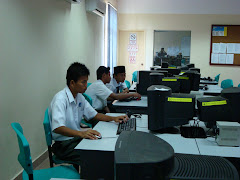Information and Communication Technology (ICT) is a powerful medium that has become increasingly important to society. The introduction of ICT as an elective subject in Malaysian secondary schools will provide a valuable training ground for students. This will help students relate their ICT learning experiences to a progressive technology-based daily life. The curriculum provides a platform for producing a technologically capable work force. This will help meet the challenges of a global economy.
This subject is offered to all Form 4 and Form 5 students. It aims to provide them with the knowledge, skills and values from several designated learning areas. It will also prepare them for the Sijil Pelajaran Malaysia (SPM) examination.
THE CURRICULUM SPECIFICATIONS
Suggested activities are incorporated as part of the teaching- learning strategy. It should be borne in mind that teachers are also encouraged and expected to employ other effective strategies in line with the needs of the target group.
What is it?
The Curriculum Specifications is a document that contains detailed explanations of the basic information required within the subject curriculum. It is designed as a teaching guide to help the teacher interpret and implement the Information and Communication
Technology (ICT) syllabus in the classroom.
Who is it for?
This document is intended for ICT teachers teaching the ICT subject at the Upper Secondary Level (Form 4 and Form 5) of the Kurikulum Bersepadu Sekolah Menengah (KBSM).
What are the Learning Areas?
The six learning areas are as follows:
Society
2.Computer Systems
3.Computer Networks and Communications
4.Multimedia
5.Programming
6.Information Systems
CURRICULUM CONTENT
The curriculum emphasizes the integration of knowledge, skills and values.
Knowledge
The knowledge to be acquired in the ICT curriculum consists
of concepts and facts about ICT as well as ICT terminology. It includes procedures in managing computer systems, sequential processes in developing products, and programming commands and syntax. It also integrates discussions on current issues related to ICT and their implications for the future.
Skills
The skills involved are communication skills, information management skills, managing computer systems and problem-solving skills.The details of each skill are as follows :
Communication skills refer to the process of gaining and disseminating information verbally or non-verbally. These involve:
Information sharing and dissemination
Production through various means including graphic presentation, sketching and proto-typing using information technology
Identifying, elaborating on and interpreting various points of view
Exploiting, accessing and processing technologies with confidence and competence
Ensuring security of information distribution
Information Management Skills
Information Management Skills provide opportunities to develop information by:
maintaining the integration of information
using various inquiry techniques
identifying, searching, collecting, saving, accessing and processing information
categorising, analysing, synthesising and evaluating information
Presenting information clearly, logically,
accurately and precisely
Managing Computer Systems
This involves the use of computer hardware and software for communications and problem-solving, including the ability to identify, assemble, arrange and maintain the computer systems.
Problem-Solving Skills
Problem-solving skills provide opportunities for students to apply ways and strategies to real-life problems. These skills emphasize the following:
Logic and programming
Critical, creative, reflective and mantic thinking
Imaginative, initiative and flexibility
Identification, description, and re-interpretation of problems and analysis from various perspectives
Investigation, exploration and generation of ideas
Problem-testing and solutions
Making decisions based on experience and sound rationale
Process and product evaluation
Values
The values in the ICT syllabus are diligence, accuracy, precision, confidence, responsibility, integrity, respect, cooperation, appreciation, courtesy and abiding by the ICT Code of Ethics.
Students’ Basic Requirement
1. Students must have basic computer skills
2.Pass subject English and Mathematic at PMR result's.
Class Requirement
The maxsimum class ict student's is 10 person only.No limit minimum class student's
SUGGESTED READINGS
1. Shelly G.B, Cashman T.J, Vermaat M.E, Walker T.J.
(2005) Discovering Computers 2006 : A Gateway to
Information, Course Technology.
2. Bryan Pfaffenberger, Bill Daley (2003) Computers In Your
Future, Prentice Hall.
3. Chua Chooi See (2000) Visual Basic 6 : A Step-by-Step
Guide, Times Publication.
4. Capron H.L, J.A. Johnson (2005) Computers: Tools For an Information Age Eighth Edition, Prentice Hall.
5. George Beekman (2004) Computer Confluence : Exploring Tomorrow’s Technology, Prentice Hall.
6. Stephen McGloughlin (2001) Multimedia : Concepts and
Practice, Prentice Hall.

